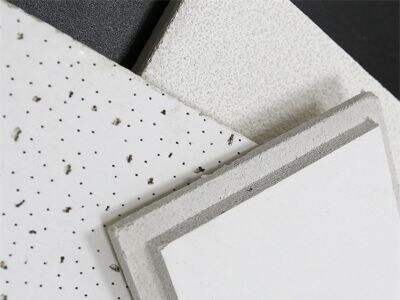Ceiling tiles are a very crucial component of structures and buildings. They help decorate a room, but they can also keep it safe and functional. That ceiling often determines the feel of a room when you enter it. This variety can make it hard to choose the most suitable one for your space; there are several different types of ceiling tiles. In this article we will discuss two common varieties of ceiling tiles — mineral fiber and soft fiber tiles. Each type is made of course with what makes them special.
Mineral Fiber Ceiling Tiles
What Is Mineral Fiber Ceiling Tiles Made From: They have stone wool, starch and recycled paper mixed together. Tiles can be found in many shapes, sizes and patterns, giving you plenty of choices. Another positive aspect of Mineral Fiber Ceiling Tile is that they are very light. They are light, making them easier to install and handle. This means you won’t have to wrestle much when hanging them.
An additional benefit of mineral fiber tiles is their ability to reduce noise in a room. This matters if you’re hoping for a quiet place to work or unwind. Even in winter, mineral fiber tiles can make your room warm. They achieve this by keeping the heat from escaping your space, making it cozier on cold days.
On the other hand, mineral fiber tiles have some drawbacks too. On a side note, this kind of ceiling tiles can be costlier compared to other types. Not everyone can stretch their budget to suit. Water, in fact, can also damage mineral fiber tiles. If they get too wet, they may begin to sag or crack over time. In particular, those that are wet sensitive areas often have this particular problem.
Is it worth paying extra for Mineral Fiber Tiles?
Case in point: the benefits of mineral fiber ceiling tiles could perhaps be the kind of investment you're looking for when it comes to comfort and warmth at home. They conserve energy and reduce noise, so shelling out a bit more on these tiles could pay off in the long run. Additionally, as a bonus, mineral fiber tiles can potentially last a long time. That’s a lot of hassle to avoid, and these products can save you money down the line as well because you may not be replacing them for several years.
Soft Fiber Ceiling Tiles
Now, let’s turn to soft fiber tiles. These tiles are often composed of fiberglass rather than recycled materials. One key benefit of soft fiber tiles is that they are far lighter than mineral fiber tiles. This makes them very simple to operate and set up. Soft fiber tiles are really easy to handle if you are a DIY person.
Soft fiber tiles have moisture resistant properties too. This means they can be installed in areas that tend to become damp, including bathrooms, kitchens and basements. This feature makes soft fiber tiles a great option for those in need of a tile that can stand up to humidity. Also, soft fiber tiles can be found in lower price ranges than mineral fiber ceiling tile, so they are a nice choice for anyone on a budget.
That said, there are a few intricate details to consider with regards to soft fiber tiles. They are not as effective at absorbing sound as mineral fiber tiles, which might be a concern for people who want a quieter space. A potential disadvantage of soft fiber tiles, however, is that they are prone to more damage. They may not last as long, if exposed to strong chemicals or mishandled.
Which Type is Better?
Overall, the difference between mineral fiber and soft fiber ceiling tiles simply comes down to your unique ceiling needs! Both varieties have their upsides and downsides. Choose ceiling mineral fiber if you want to find some ceiling tiles that can save energy and reduce noise. If you want something budget-friendly with high resistance to moisture, however, soft fiber tiles are probably for you.
When making a decision, consider where you’re going to be installing the tiles, how use the room and what qualities are going to matter most to you. You have to consider the environment of a room and this will help you make the right decision.
Which is Easier to Use?
Mineral fiber and soft fiber tiles are both easy to work with. Soft fiber tiles, on the other hand, are much lighter and easier to handle. This is quite an advantage if you are doing the ceiling tile installation on your own. Because they’re light, you won’t require much assistance. Mineral fiber tiles, on the other hand, are heavier and bulkier so you may need a second person to help install them properly.
Ultimately, while the distinction of mineral fiber vs. soft fiber ceiling tiles may appear small on the surface, they create a difference in this system that can drastically affect how your room looks and feels, as well as its longevity throughout time! Before reaching a final decision, it is crucial to weigh the advantages and disadvantages of each category of ceiling tile carefully. So, whatever type of tile you prefer; rest assured that there are plenty available and if all else fails, the ceiling tiles can be found anywhere to suit your requirements and budget.

 EN
EN












































